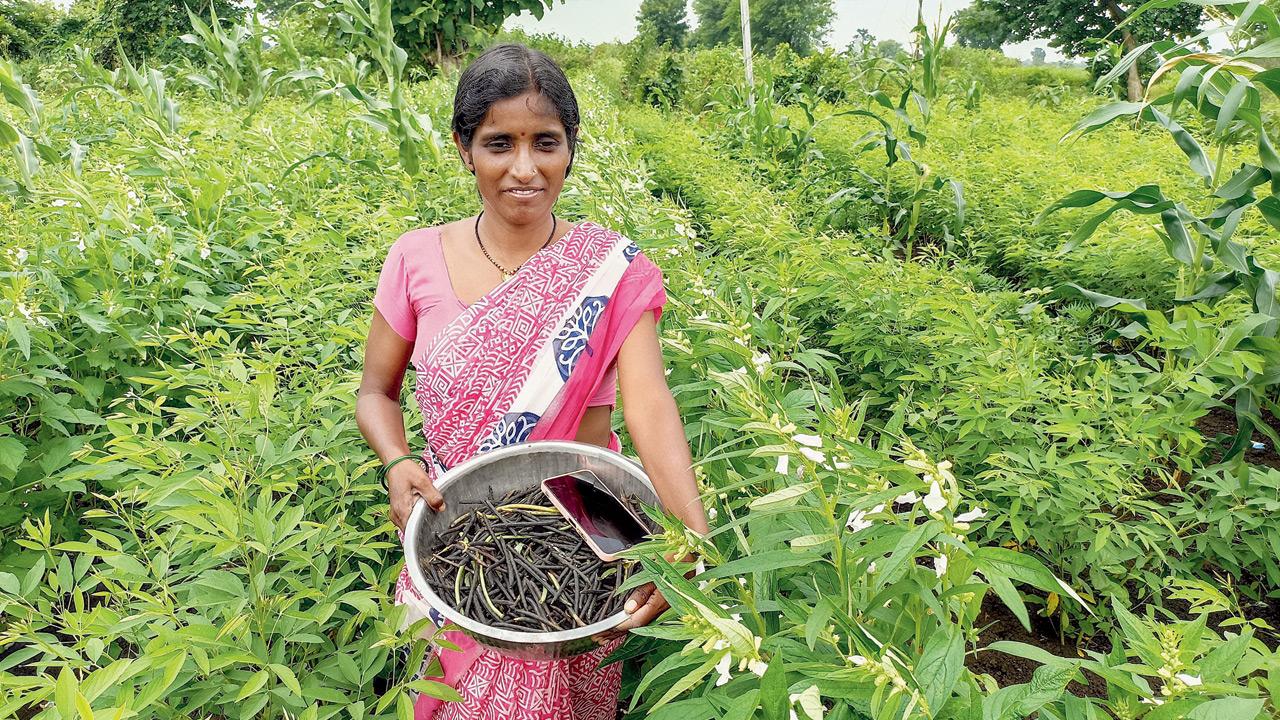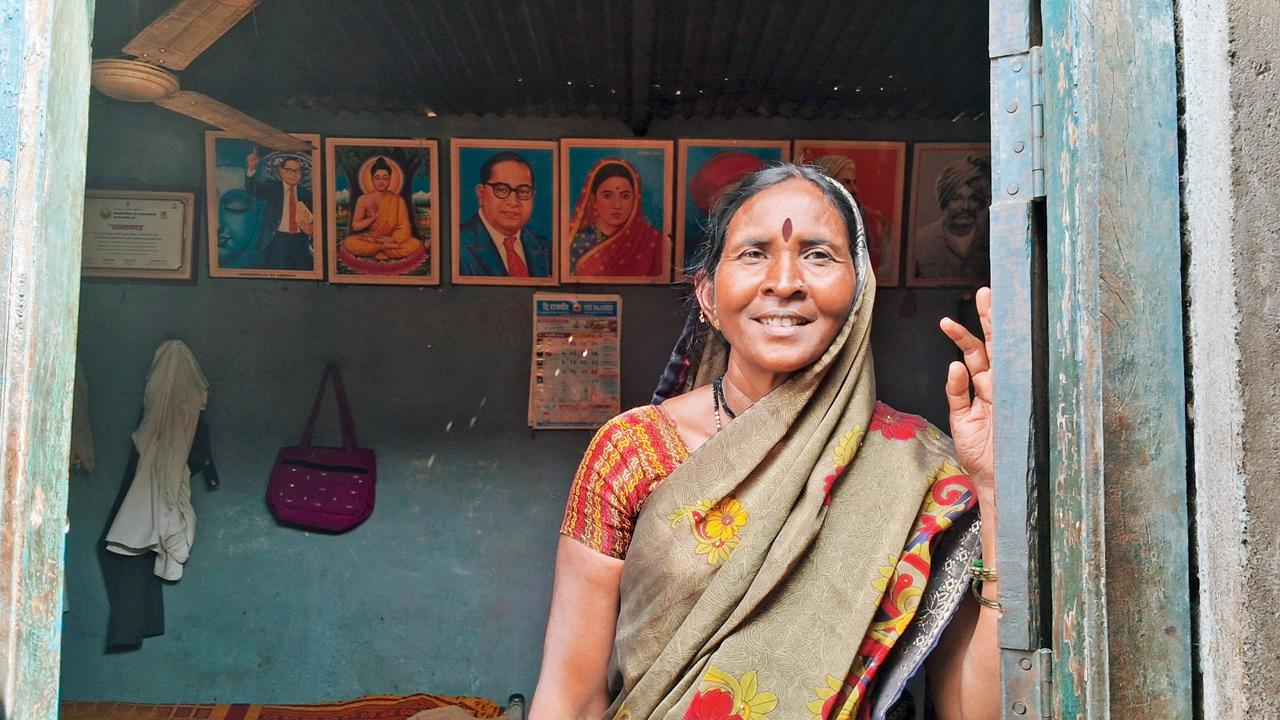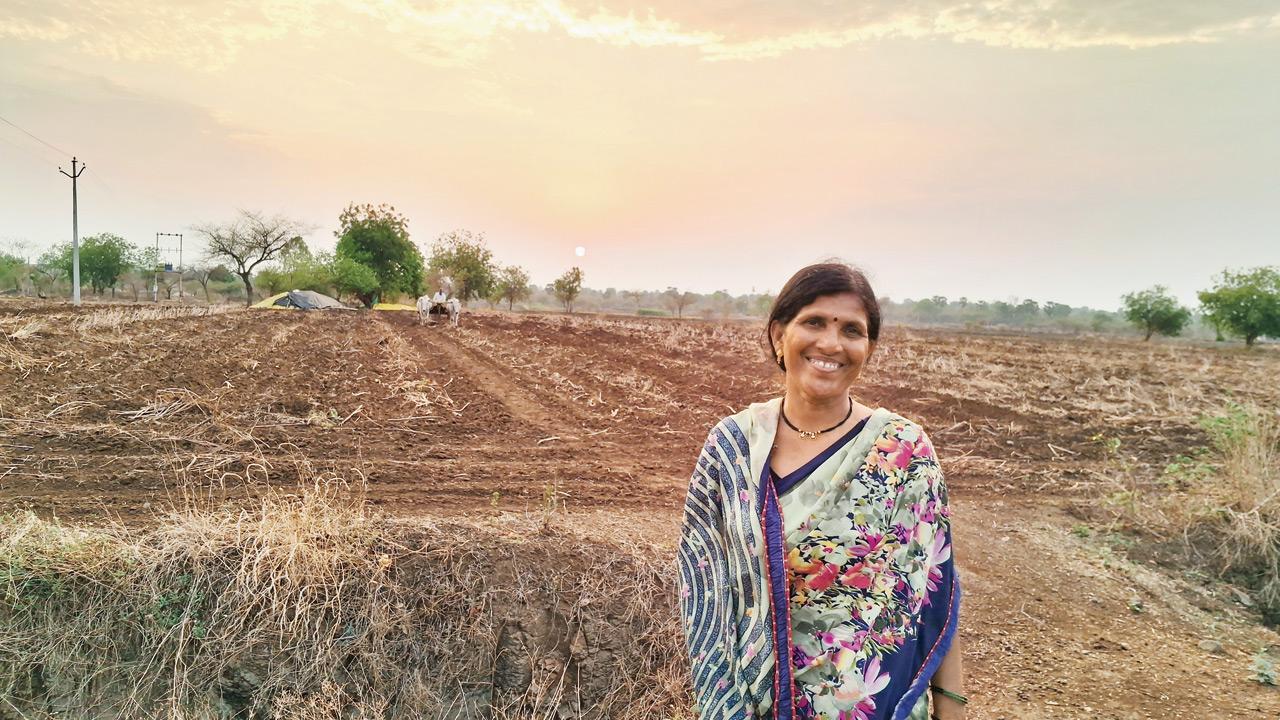In a book released in Marathi and English, 12 women farmers from rural Maharashtra share the quiet joy of planting indigenous seeds in an earth that breathes free of fertilisers

Chanda Ghodam, from Warud, Yavatmal, turned her half-acre farm into a lab, developing a pesticide for her rajgira crop. She also pioneered ambadi flower pickle, unheard of locally. Pic/Swati Satpute
![]() Binvisacha khayala bhetataya—We get to eat poison-free food.” It is the deepest joy, the kind that comes from tearing into a bhakri of organic bajra, untouched by urea. One of these, says Suman Ovhal, 50, satisfies her more than two made from hybrid grain.
Binvisacha khayala bhetataya—We get to eat poison-free food.” It is the deepest joy, the kind that comes from tearing into a bhakri of organic bajra, untouched by urea. One of these, says Suman Ovhal, 50, satisfies her more than two made from hybrid grain.
Born into a Matang caste family in Khutewadi, Ovhal’s life was shaped by hardship. Her father, a landless labourer, worked as a stone carrier and carpenter, earning just enough grain. At 10, she joined the family’s lifeline—cutting sugarcane to survive.
At 12, she was married into the Ovhal family in Kathoda, Beed. Her parents had little choice—the groom’s family owned gayraan zameen, making the proposal more appealing. But daily wage labour remained their reality. Her husband played the drum in a local band, but that was seasonal; the farm was their real sustenance.

Padma Bhusari’s family opposed her planting urad, moong, sesame, and maize—never before grown on their soil—but when the crops thrived, they had to acknowledge her experimentation. Pic/Swati Satpute
In Kathoda, Suman joined a large family where relentless farm work continued. Over time, she cultivated her own one-acre plot, growing bajra, chillies, drumsticks, and leafy greens—enough to share. Joining a bachat gat (self-help group) helped her shift to organic farming, improving her family’s nutrition; much in consonance with Saint Dnyaneshwar’s disapproval of akhadyacheni bhojane—food lacking quality fails to satisfy.
Ovhal is one of 12 women farmers in Pushkala: Plentiful, a bilingual booklet by MAKAAM (Mahila Kisan Adhikaar Manch) and SOPPECOM (Society for Promoting Participative Ecosystem Management). The title alludes to PS Rege’s renowned Marathi poem.
Launched in 2021, the farming initiative now includes 250 women cultivating 140 acres of poison-free land across six Maharashtra districts, supported by grassroots organisations. Written by Prashant Khunte and Swati Satpute, with English translations by Mini Shrinivasan, the stories reflect resilience, knowledge, and the quiet revolution of women reclaiming farming.

Suman Ovhal cultivated her own one-acre plot, growing bajra, chillies, drumsticks, and leafy greens. Joining a bachat gat (self-help group) helped her shift to organic farming. Pic/Prashant Khunte
The summaries, in both English and Marathi, are inspiring, but could have been more muscular. Richer insights could have deepened the narratives, but they often blur together, making it harder to distinguish each woman’s unique journey. Caste realities (jaat vaastav) are mentioned but not explored.
The magic of Rege’s Pushkala could have been carried over more symbolically in individual stories. The layered Marathi cadence (pushkalatali pushkal tu) feels inevitably flattened in English—as the two languages negotiate life differently. But what the book loses in detail, it gains in sincerity. It didn’t start as a book but grew organically from research and a shared commitment to sustainable, community-driven farming. Rarely have Maharashtra’s women farmers been heroed like this. These women challenge the mainstream agrarian model, which extracts natural resources, replaces diversity with monocultures, and prioritises chemical inputs over sustainable investments.
The Pushkala collage gains from grassroots collaborators like Chetna Vikas, Prakriti (Nagpur), Prerna Gramvikas Sanstha (Yavatmal), Ugam Grameen Vikas Sanstha, Sahyadhri Bahuddeshiya Sanstha (Hingoli), Rajalaxmi Pratishthan (Parbhani), and Jagar Pratishthan (Beed).

It’s the dawn of new hope for women farmers like Sangeeta Tayade, who sow indigenous seeds and eschew the use of chemical fertilisers and pesticides. Pic/Prashant Khunte
The purpose of the book is to bring visibility to the women farmers—their resilience, agency and innovativeness. “While a book cannot ease the problems of the women, it is the years of work that has gone into it that certainly does alleviate their miseries. It creates opportunities and a space for them to assert their rights over resources such as land, water, knowledge,” says Seema Kulkarni, one of the book’s conceptualisers and senior fellow of SOPPECOM.
Pushkala spanned over five years, coinciding with COVID-19, a time when securing food became a challenge for women farmers, sugarcane labourers, migrant workers, adivasi and dalit women—everyone pledged to prioritise food and nutrition security by growing diverse (up to 20) crops on their land before selling produce in the market.
All the women in Pushkala share a belief—farming that nurtures the soil. Sixty-year-old Sattubai Paikrao from Basamba (Hingoli) cultivates four acres. She never attended school but is known as an innovator. When delayed rains threatened moong, she planted podless plants to enrich the soil. When caterpillars infested her toor crop, she shook the plants, crushed the fallen pests into the soil, and solved the problem—no chemicals needed. Her biggest discovery—decomposed nilgai dung—boosted her garlic yield.
Sattubai’s leadership has drawn 30 women of diverse backgrounds into organic farming. As the book highlights, her Dalit neo-Buddhist identity has not deterred her following across Wanjari, Mali, Charmakar, and Pareet communities.
Padma Bhusari’s leadership began with a setback—failing Class 9 after missing an exam due to excessive menstrual bleeding. She dropped out, married young, and entered a farming household despite her urban upbringing, knowing nothing of cultivation. After losing her firstborn at 12, she balanced grief, household duties, and raising her second child. Through Prakriti, she resisted genetically modified Bt cotton and chemical fertilisers. Her family opposed her planting urad, moong, sesame, and maize—never before grown on their soil—but when the crops thrived, they had to accept. She later introduced organic pumpkins, challenging
traditional taboos.
The book highlights women farmer leaders who, despite the small scale of their experiments, inspire others. Chanda Ghodam (Warud, Ralegao, Yavatmal) turned her half-acre farm into a lab, developing a pesticide for her rajgira crop. She also pioneered ambadi flower pickle, unheard of locally.
Sarita Vairale (Shelu Bazar, Murtizapur, Akola) lost her husband to debt-driven suicide. She planted moong, urad, vegetables, and non-Bt cotton. A poor first crop didn’t deter her; she replanted and earned '32,000 in one go.
Nilima Renghe (Zadgao, Ralegao, Yavatmal), widowed at 27 and pregnant, was rejected by her in-laws. She fought back and secured three acres for her child.
Kumudini Dhole (Champa, Saoner, Nagpur), widowed twice and rejected by her stepson, legally claimed her farmland. Once reliant on markets, she now grows her own food.
PS Rege’s Pushkala poem was once an alliterative wonder for this columnist—a cascade of sound and syllables. I never imagined it would return in this green form—the quiet plenty of farms tended by women, where the earth gives and is given to in return.
Sumedha Raikar-Mhatre is a culture columnist in search of the sub-text. You can reach her at sumedha.raikar@mid-day.com
 Subscribe today by clicking the link and stay updated with the latest news!" Click here!
Subscribe today by clicking the link and stay updated with the latest news!" Click here!








